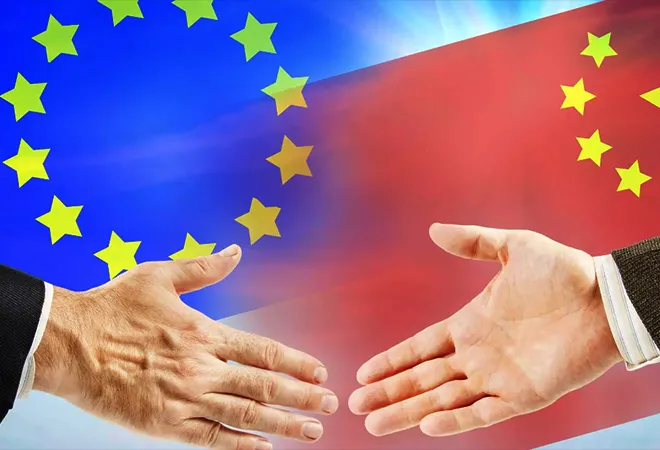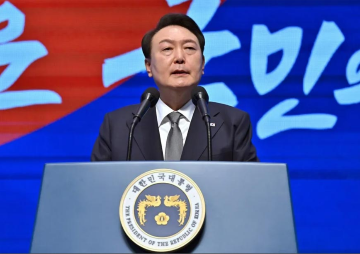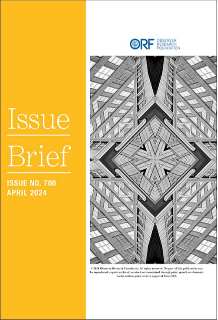
The relations between China and the countries of Eastern Europe have come under greater scrutiny as the Ukraine crisis has progressed. While these countries had, initially, promoted themselves as the ‘gateway to Europe’ for China, the tacit support that Beijing has provided Moscow under their ‘no-limits friendship’ has not gone unnoticed. The
joint communique released after the Xi-Putin meeting in February 2022 highlighted that China was “sympathetic to and supports the proposals put forward by the Russian Federation to create long-term legally binding security guarantees in Europe”. This has been interpreted by Eastern Europe as Beijing’s support for NATO going back to its pre-1997 border, as was demanded by Russia in its
December 2021 proposals, thereby, changing the delicate security balance in the region. However, enthusiasm for relations with China was already waning even before the Ukraine crisis began. This article looks at some of the reasons behind the shifting Eastern Europe-China relations.
Shifting East Europe-China Relations
With the political stabilisation and economic integration into the European Union (EU) bringing growth and prosperity to the region, Eastern European countries began looking outwards towards new markets and partnerships. China emerged as a key partner primarily due to its fast-growing economy. The dialogue between the two was constituted under the aegis of the 16+1 mechanism, which promised investments and an opportunity for these countries to diversify away from their dependence on the European market. However, the emerging disillusionment with China has led these countries to re-evaluate their partnership with Beijing. Following are some of the reasons for Eastern European countries drifting away from China:
From 16+1 to 17+1 to 14+1
Launched in 2012, China and 16 countries from Central and Eastern Europe established the 16+1 mechanism to attract Chinese infrastructure investments and technological cooperation to the region. The mechanism expanded to become 17+1 in 2019 with Greece becoming a member. This framework has been a cause of concern among the EU member countries, which have viewed it as a Chinese attempt to undermine the solidarity of the Union. The EU’s concerns were also highlighted in its
Strategy on China, which pointed out that “all Member States, individually and within sub-regional cooperation format such as the 16+1, have a responsibility to ensure consistency with EU law, rules and policies.”
With the political stabilisation and economic integration into the European Union (EU) bringing growth and prosperity to the region, Eastern European countries began looking outwards towards new markets and partnerships.
However, the disillusionment with China had been increasing within the region primarily because the scope of FDIs from China never reached the proposed level.
In 2021, Eastern Europe received 3 percent of Chinese direct investments while the Western European countries such as the Netherlands, Germany, France and the UK accounted for maximum investments. Increasing concerns regarding Chinese security threats led many countries to re-evaluate their outlook towards Beijing. The first sign of divergence emerged when Lithuania withdrew from the mechanism in 2021, followed by Estonia and Latvia in August 2022, bringing the strength of the framework down to 14+1. There was also news regarding the Czech Republic’s Parliament
adopting a resolution asking the Foreign Ministry to explore ways to withdraw from the mechanism. While many countries in the region are looking to diversify their relations away from China or are increasingly concerned regarding Beijing’s actions, there are countries that are deepening their partnership. The key outlier in this regard is Hungary, which signed one of the
largest investment deals with China in August 2022, which is expected to bring in 7.3-billion euros of investment.
Unfulfilled BRI promises
One of the key causes of the increasing disillusionment is the unfulfilled promise of infrastructure investments in the region under the Belt and Road Initiative (BRI). These countries, largely due to their geostrategic locations, were pegged to become a bridge for China to connect with the rest of the continent. However, the lack of tangible results and investments have led to the lowering of expectations— a majority of the projects have either been abandoned or have been frozen due to multiple reasons, while some have come under scrutiny due to unsustainable debt issues. For example, the Romanian government, in 2020,
terminated negotiations with China General Nuclear Power Corporation on the construction of two nuclear plants. This was followed by the
banning of Huawei from Bucharest’s 5G networks over security concerns; and, in 2021, Bucharest passed
a memorandum to impose restrictions on operators from non-EU countries for infrastructure development. Also, the flagship BRI-Budapest-Belgrade high-speed rail link project is
expected to be operational only by 2025. A notable exception to this is Pelješac Bridge in Croatia, which was opened in 2021—one of the few projects that have been completed.
However, the lack of tangible results and investments have led to the lowering of expectations— a majority of the projects have either been abandoned or have been frozen due to multiple reasons, while some have come under scrutiny due to unsustainable debt issues.
Moreover, there is a growing debate regarding the unsustainable debts associated with BRI—which has the potential to overwhelm the smaller economies of the region. A case in point is the Chinese-built highway project in Montenegro, which resulted in
Podgorica’s
debt climbing to more than 100 percent of its GDP. While there are countries within the region, such as Hungary and Serbia, that are enthusiastic partners of China, the majority of the countries are growing ambivalent towards the possibilities of China using its economic heft and BRI as a political tool in the region. These concerns have been further cemented due to China’s position towards the Russia-Ukraine conflict.
China-Russia nexus
Since the beginning of the Ukraine crisis, the East European countries have been at the forefront of driving the EU’s response. China’s decision to support Russia’s demands to change the European security architecture to the pre-1997 era has led to increasing apprehensions regarding its intentions. For the Eastern European countries, NATO is an important pillar of their defence apparatus and is a key security guarantor; and given their own history with Russia, this aspect for them is non-negotiable. The crisis has resulted in a major restructuring of their own military and defence spending. While these countries saw China as an important economic actor, its backing of Russian claims has led many countries to re-evaluate their relations with Beijing factoring in the political and security risks that comes with the partnership.
China’s decision to support Russia’s demands to change the European security architecture to the pre-1997 era has led to increasing apprehensions regarding its intentions.
This ‘no-limit’ partnership has also resulted in increasing negative public opinion. According to an opinion poll that questioned the factors that might have contributed to worsening of opinion on China, 66 percent voted for its partnership with and support for Russia; interestingly, 40 percent also were of the opinion that China supports or enables the invasion of Ukraine; and on overall opinion of China, 61 percent voted for unfavourable.
The Taiwan factor?
The lack of tangible deliverables from the partnership with China has also resulted in countries pivoting to Taiwan. Lithuania, in 2021,
was targeted by economic sanctions, boycotting of its goods, and downgrading of diplomatic relations by China after its decision to open the ‘Taiwanese Representative Office’ in Lithuania, the first office in Europe to be called Taiwanese instead of Taipei. Beijing’s reaction also led the European Commission to propose tools to counter the use of economic coercion by third countries, although it is yet to be ratified by the EU Parliament. However, the Parliament in 2022
passed a resolution, which condemned ‘China’s military aggression against Taiwan’ and said that its “provocative actions must have consequences on relations with the EU”.
Another case in point is that the newly elected President of the Czech Republic, Petr Pavel
recently stated that ‘China and its regime is not a friendly country at this moment, it is not compatible with western democracies in their strategic goals and principles’ and that he “stands ready to meet Taiwanese President Tsai-Ing Wen at some stage and wants stronger ties with Taiwan.” These comments came after his
phone-call with the Taiwanese President where he had emphasised on shared values of freedom, democracy, and human rights. China has
reacted by saying that the President-elect had “trampled on China’s red line”. A 150-member delegation led by Speaker of the Czech Chamber of the Deputies, Markéta Pekarová Adamová is
expected to visit Taiwan from 25-30 March 2023 with a focus on expanding trade, research, education, and cultural ties.
Beijing’s reaction also led the European Commission to propose tools to counter the use of economic coercion by third countries, although it is yet to be ratified by the EU Parliament.
According to a
study done by CEIAS, these countries are the key drivers in developing EU-Taiwan relations and making up to 60 percent of all interactions between the two. In the period from 2019-2022, the EU’s Taiwan-related activities increased from 23 to 167 including engagements across governmental, parliamentary, and dialogue platforms. Among the countries of the region, Lithuania, Slovakia, Czechia, and Poland are the most active members. The key factors for the increased interest within these countries to cooperate with Taiwan includes fatigue in relations with China due to the unfulfilled potential of the partnership; the emergence of leadership which is critical of China; and the emerging business opportunities with Taiwan, especially in trade, science, high-technology and semi-conductors. To support investments, building businesses, and leveraging supply chains, Taipei
launched a Central and Eastern Europe Investment Fund in March 2022 with an initial capital of US $200 million. The target countries include—Lithuania, the Czech Republic, and Slovakia. These actions highlight an inflection point in the relations of East Europe with China and marks a shift towards Taiwan.
Conclusion
Sensing the growing unease in its relations with the Eastern European countries, China
sent a delegation led by Huo Yuzhen, the Foreign Ministry’s special representative for China and Central and Eastern European cooperation, to eight countries in Eastern Europe (Czech Republic, Slovakia, Hungary, Croatia, Slovenia, Estonia, Latvia and Poland) to stem growing suspicions in the region over its
“no-limits” ties with Moscow. The visit received limited welcome where it failed to garner any attention from the higher echelons of the governments.
While Eastern Europe’s enthusiasm for Chinese investment had begun to ebb even before the Russian invasion, this crisis has further alienated these countries from Beijing. Countries of the region have already frozen projects which were under BRI, are working towards suspending participation of Chinese companies in the telecom and infrastructure sectors, and are taking a harder position on Chinese foreign policy. For a long time, East Europe and China’s relations were guided by pragmatism, dialogue and economic imperatives. However, as one sees it today, pragmatism and economy have been replaced by questions on values, interests, and more importantly, security. This is driving a rethinking and re-evaluation of their approach towards China.
The views expressed above belong to the author(s). ORF research and analyses now available on Telegram! Click here to access our curated content — blogs, longforms and interviews.



 The relations between China and the countries of Eastern Europe have come under greater scrutiny as the Ukraine crisis has progressed. While these countries had, initially, promoted themselves as the ‘gateway to Europe’ for China, the tacit support that Beijing has provided Moscow under their ‘no-limits friendship’ has not gone unnoticed. The
The relations between China and the countries of Eastern Europe have come under greater scrutiny as the Ukraine crisis has progressed. While these countries had, initially, promoted themselves as the ‘gateway to Europe’ for China, the tacit support that Beijing has provided Moscow under their ‘no-limits friendship’ has not gone unnoticed. The  PREV
PREV


